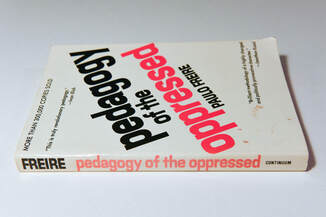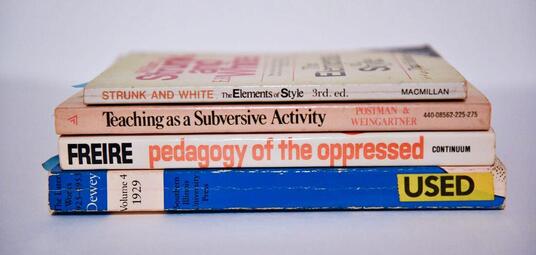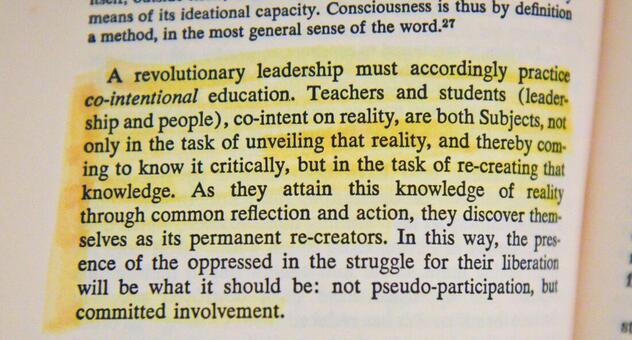Pedagogy of the Oppressed
Background
Pictured here is a 1989 copy of Pedagogy of the Oppressed written by Paulo Freire (1921-1997). A prominent critical theorist and author, he believes that education is a mutual process between the teacher and student. Freire argues that to effectively teach those in poverty and make positive change educators need to work in a bottom-up as opposed to a top-down approach, where educators work with the students with what is around them; to use critical theory in real life situations to teach. According to ThoughtCo, “critical theory is a social theory oriented toward critiquing and changing society as a whole” that “aim[s] to dig beneath the surface of social life and uncover the assumptions that keep human beings from a full and true understanding of how the world works.”
Freire worked with Brazilian adult illiterates and became a part of an education movement to combat widespread illiteracy. They used teaching methods that he developed to create courses for coordinators throughout Brazil. After his imprisonment for “subversive elements in his teaching” (Freire Institute) following the coup d’etat in 1964, Freire was exiled to Chile, where his teaching methods were utilized and appreciated, which enabled him to publish Pedagogy of the Oppressed in 1972. He then became a United Nations consultant and a Harvard lecturer before returning to Brazil in 1979 to join the Workers’ Party where he could continue his adult literacy teaching through heading the Workers’ Party’s project. In 1988, Freire was appointed Sao Paulo’s Secretary of Education.
Pictured here is a 1989 copy of Pedagogy of the Oppressed written by Paulo Freire (1921-1997). A prominent critical theorist and author, he believes that education is a mutual process between the teacher and student. Freire argues that to effectively teach those in poverty and make positive change educators need to work in a bottom-up as opposed to a top-down approach, where educators work with the students with what is around them; to use critical theory in real life situations to teach. According to ThoughtCo, “critical theory is a social theory oriented toward critiquing and changing society as a whole” that “aim[s] to dig beneath the surface of social life and uncover the assumptions that keep human beings from a full and true understanding of how the world works.”
Freire worked with Brazilian adult illiterates and became a part of an education movement to combat widespread illiteracy. They used teaching methods that he developed to create courses for coordinators throughout Brazil. After his imprisonment for “subversive elements in his teaching” (Freire Institute) following the coup d’etat in 1964, Freire was exiled to Chile, where his teaching methods were utilized and appreciated, which enabled him to publish Pedagogy of the Oppressed in 1972. He then became a United Nations consultant and a Harvard lecturer before returning to Brazil in 1979 to join the Workers’ Party where he could continue his adult literacy teaching through heading the Workers’ Party’s project. In 1988, Freire was appointed Sao Paulo’s Secretary of Education.
Donor
This book was generously donated By Cheryl Ahern-Lehmann in 2006 alongside a third edition of William Strunk Jr. and E.B. White’s The Elements of Style, Neil Postman and Charles Weingartner’s Teaching as a Subversive Activity, and a fourth edition of a John Dewey anthology, John Dewey: The Later Works, 1925-1953, edited by Jo Ann Boydston. She donated these four books— pictured above— because they were classic books on education that she always had on her bookshelf throughout her time as an educator. Ahern-Lehman always loved teaching and told MOTAL that “most of [her] teaching stuff comes straight out of these classic books.”
This book was generously donated By Cheryl Ahern-Lehmann in 2006 alongside a third edition of William Strunk Jr. and E.B. White’s The Elements of Style, Neil Postman and Charles Weingartner’s Teaching as a Subversive Activity, and a fourth edition of a John Dewey anthology, John Dewey: The Later Works, 1925-1953, edited by Jo Ann Boydston. She donated these four books— pictured above— because they were classic books on education that she always had on her bookshelf throughout her time as an educator. Ahern-Lehman always loved teaching and told MOTAL that “most of [her] teaching stuff comes straight out of these classic books.”
One of the quotes that Ahern-Lehman highlighted in this copy of Pedagogy of the Oppressed is as follows:
“A revolutionary leadership must accordingly practice co-intentional education. Teachers and students (leadership and people), co-intent on reality, are both Subjects, not only in the task of unveiling that reality, and thereby coming to know it critically, but in the task of re-creating that knowledge. As they attain this knowledge of reality through common reflection and action, they discover themselves as its permanent re-creators. In this way, the presence of the oppressed in the struggle for their liberation will be what it should be: not pseudo-participation, but committed involvement” (56).
For about fourteen years, Ahern-Lehman taught master’s degree physiology, education and nursing home courses at the University of San Diego, where she supported students and advocated for the students' side in faculty discussions since she believes that we all have things to teach each other. After retirement, she went on to develop the curriculum for the PhD in nursing for National University.
“A revolutionary leadership must accordingly practice co-intentional education. Teachers and students (leadership and people), co-intent on reality, are both Subjects, not only in the task of unveiling that reality, and thereby coming to know it critically, but in the task of re-creating that knowledge. As they attain this knowledge of reality through common reflection and action, they discover themselves as its permanent re-creators. In this way, the presence of the oppressed in the struggle for their liberation will be what it should be: not pseudo-participation, but committed involvement” (56).
For about fourteen years, Ahern-Lehman taught master’s degree physiology, education and nursing home courses at the University of San Diego, where she supported students and advocated for the students' side in faculty discussions since she believes that we all have things to teach each other. After retirement, she went on to develop the curriculum for the PhD in nursing for National University.
Learn More!
Read a LitCharts summary and learn more about the themes covered in Pedagogy of the Oppressed
Read about our collection of McGuffey Eclectic Readers here.
Want to learn more about critical theory? Read this.
Sources:
https://www.litcharts.com/lit/pedagogy-of-the-oppressed/summary
https://www.freire.org/paulo-freire/paulo-freire-biography/
https://www.freire.org/paulo-freire/quotes-by-paulo-freire/
https://www.freire.org/paulo-freire/concepts-used-by-paulo-freire/
https://www.thoughtco.com/critical-theory-3026623
Researched by
Katie Rutz-Robbins
MOTAL Intern
June 2021
Read a LitCharts summary and learn more about the themes covered in Pedagogy of the Oppressed
Read about our collection of McGuffey Eclectic Readers here.
Want to learn more about critical theory? Read this.
Sources:
https://www.litcharts.com/lit/pedagogy-of-the-oppressed/summary
https://www.freire.org/paulo-freire/paulo-freire-biography/
https://www.freire.org/paulo-freire/quotes-by-paulo-freire/
https://www.freire.org/paulo-freire/concepts-used-by-paulo-freire/
https://www.thoughtco.com/critical-theory-3026623
Researched by
Katie Rutz-Robbins
MOTAL Intern
June 2021



